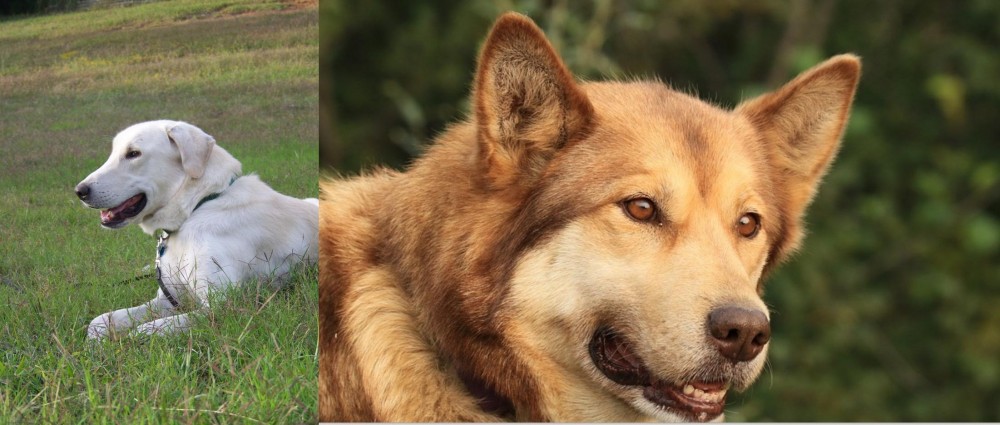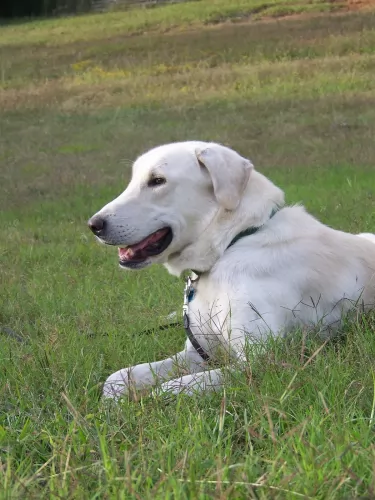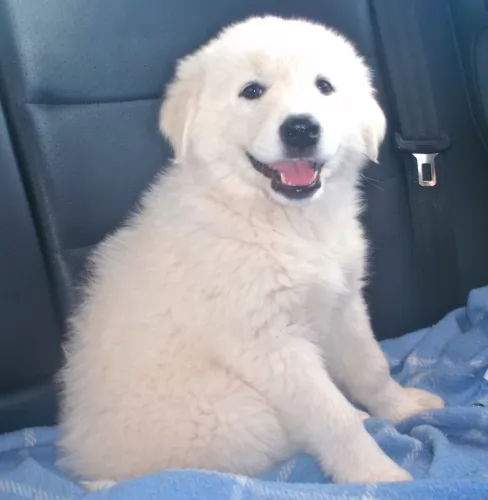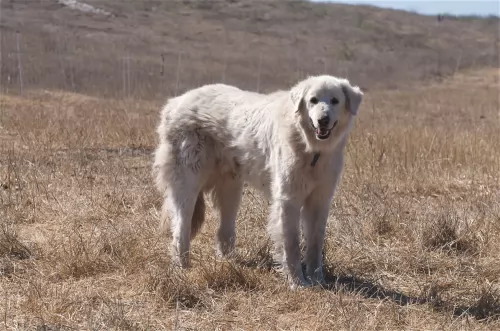 Petzlover
Petzlover Akbash Dog is originated from Turkey but Seppala Siberian Sleddog is originated from Canada. Akbash Dog may grow 26 cm / 11 inches higher than Seppala Siberian Sleddog. Akbash Dog may weigh 42 kg / 93 pounds more than Seppala Siberian Sleddog. Akbash Dog may live 4 years less than Seppala Siberian Sleddog. Akbash Dog may have more litter size than Seppala Siberian Sleddog. Both Akbash Dog and Seppala Siberian Sleddog requires Moderate Maintenance.
Akbash Dog is originated from Turkey but Seppala Siberian Sleddog is originated from Canada. Akbash Dog may grow 26 cm / 11 inches higher than Seppala Siberian Sleddog. Akbash Dog may weigh 42 kg / 93 pounds more than Seppala Siberian Sleddog. Akbash Dog may live 4 years less than Seppala Siberian Sleddog. Akbash Dog may have more litter size than Seppala Siberian Sleddog. Both Akbash Dog and Seppala Siberian Sleddog requires Moderate Maintenance.
 Akbash breed became popular in the 1970s. Around that period, Akbash was introduced to North America. There is archeological evidence that this breed was popular even in the 750-300 BC. Of course, it wasn’t the exact dog as we know it today, but there are many similarities between Akbash and dog from the ancient period. This breed was developed in Turkey to be a guardian dog. They were perfect flock guardians.
Akbash breed became popular in the 1970s. Around that period, Akbash was introduced to North America. There is archeological evidence that this breed was popular even in the 750-300 BC. Of course, it wasn’t the exact dog as we know it today, but there are many similarities between Akbash and dog from the ancient period. This breed was developed in Turkey to be a guardian dog. They were perfect flock guardians.
 This is a rare working dog breed whose job it has been to pull sleds. The Seppala Siberian Sleddog hails from Canada and was regarded as the same dog breed as the Siberian Husky.There is the International Seppala Siberian Sleddog Club which works to preserve this amazing dog as a working breed.
This is a rare working dog breed whose job it has been to pull sleds. The Seppala Siberian Sleddog hails from Canada and was regarded as the same dog breed as the Siberian Husky.There is the International Seppala Siberian Sleddog Club which works to preserve this amazing dog as a working breed.
It was during the 1990s that the breed was recognized as a new breed. In 2002 the Seppala Siberian Sleddog lines found their way to the USA .
 Weight of the Akbash dog variates from 41-64kg, while their height is 71-78cm. Female Akbash is smaller than a male Akbash, but not for much.
A lifespan of an average Akbash dog is 10-11 years, but if they have cared properly, they tend to live longer.
Litter Size of Akbash is 8-9 puppies.
Another Name for Akbash is Akbas Coban Kopegi, Coban Kopegi.
Weight of the Akbash dog variates from 41-64kg, while their height is 71-78cm. Female Akbash is smaller than a male Akbash, but not for much.
A lifespan of an average Akbash dog is 10-11 years, but if they have cared properly, they tend to live longer.
Litter Size of Akbash is 8-9 puppies.
Another Name for Akbash is Akbas Coban Kopegi, Coban Kopegi.
 The Seppala Siberian Sleddog is a medium-sized dog that stands at between 56 to 58cm in height and weighs between 18 to 23kg.
The Seppala Siberian Sleddog is a medium-sized dog that stands at between 56 to 58cm in height and weighs between 18 to 23kg.
It’s a beautiful wolf-like looking dog that used to be the same breed as the Siberian Husky, but it is now considered a separate breed.
The legs of this dog are longer, and they’re slightly more slender and lighter. The ears too, are taller and held very erect. The bushy tail is held high, curving over the back when alert.
The thick coat is medium length and there is also a thick undercoat. Coat colors vary and are wolf-like too - white, cream, grey, black and some reddish rusty colors. Eyes can be blue or brown or the dog can even have one brown eye and one blue.
Because this is an active working breed, he will need some robust exercise. Neglecting this side of him will result in a bored dog that howls a lot.
He is a high energy dog breed and won’t be content with a walk every day. When you go cycling or jogging, you can definitely count him in as he will like nothing more than to run beside you. If you are lucky to live near the beach, a tennis racquet to send the ball flying across the sand will please him no end.
He will need training and socialization of course, and you won’t have trouble training him as he is an intelligent dog. He isn’t the kind of dog that slots easily into life in the city, and will ideally suit a property with large grounds where he can run and play.
 Have in mind that Akbash is a large and powerful dog. They are bred through generations to be guardians and suspicious. They are very independent because they tend to make their own decisions while guarding flocks. They will require adequate socialization, but overall, they are very intelligent and they tend to learn quickly. It requires time and patience, but are great pets for right owners. Akbash has a white to biscuit color coat. They also have a dark pigment around nose, eyes, and mouth. Akbash is very quick and agile dog, which might be surprised because of its size.
Have in mind that Akbash is a large and powerful dog. They are bred through generations to be guardians and suspicious. They are very independent because they tend to make their own decisions while guarding flocks. They will require adequate socialization, but overall, they are very intelligent and they tend to learn quickly. It requires time and patience, but are great pets for right owners. Akbash has a white to biscuit color coat. They also have a dark pigment around nose, eyes, and mouth. Akbash is very quick and agile dog, which might be surprised because of its size.
It is important to train them since the puppyhood. They are working dogs and they will be happy when they have tasks during training. Due to their independence, consistent and steady training is important. An old-fashioned way of training that includes punishment is not recommendable. Positive training with awards is the best way to train your Akbash dog. They do not require a lot of daily exercises. Daily walks would do more than enough. Younger dogs need more exercise than more mature ones. They can be very good for other animals, but they have to be socialized with them. It is the best way to socialize your dog when it is still a puppy.
 The Seppala Siberian Sleddog has always been a working dog so he will need lots of varied forms of exercise. He makes a splendid family pet as he isn’t an aggressive dog.
The Seppala Siberian Sleddog has always been a working dog so he will need lots of varied forms of exercise. He makes a splendid family pet as he isn’t an aggressive dog.
He does however make a good watchdog and will bark and warn you of strangers approaching.These beautiful wolf-like dogs are guaranteed to make you a loving, loyal pet, and they love nothing more than to be close to all his human family.
Treat him as a member of the family and you’ll be rewarded by having his fantastic friendship.
 The Seppala Siberian Sleddog, just like most other dogs, can suffer from any one of the common dog ailments there are. These illnesses are cancer, hip dysplasia and eye disease.
The Seppala Siberian Sleddog, just like most other dogs, can suffer from any one of the common dog ailments there are. These illnesses are cancer, hip dysplasia and eye disease.
You are more than likely not to see any of these illnesses with your pet, but it’s being a responsible dog owner to be aware of them and to get your pet to the vet if necessary.
Cataracts are an imperfection in the lens of the dog’s eye. The lens should be clear, but a cataract can start off small and then grow much larger, causing blindness in the dog. Cataracts happen when the cells are damaged, and diabetes can cause cataracts as can exposure to ultraviolet light. It is also an hereditary disease.
Most times dogs with cataracts can still see, but in the event of mature cataracts, your canine friend can undergo surgery to remove them.
This is another common dog disease. It can be painful for dogs, with either one or both hips being affected. Hip dysplasia can affect both young and old dogs. It can be sad seeing your active pet becoming reluctant to play. He may also have difficulty getting up from a lying down position.
There is treatment for hip dysplasia, and you will want to make sure your pet is as mobile and pain free as possible.
 Akbash dog is very easy to care. They can stay fit on a minimum amount of food. 2-2.5 cups divided into two meals would be ideal for your dog. They require meat, so giving them dry industrial food can be a solid substitute. Vegetables and oil can also be included in meals. It will keep your dog healthy and happy.
Akbash dog is very easy to care. They can stay fit on a minimum amount of food. 2-2.5 cups divided into two meals would be ideal for your dog. They require meat, so giving them dry industrial food can be a solid substitute. Vegetables and oil can also be included in meals. It will keep your dog healthy and happy.
Puppies have to eat more meals per day. It is the best to give your puppy Akbash 3-5 meals per day. Those meals should be divided into smaller portions. It is recommended to give your puppy all necessary vitamins and minerals that include calcium for stronger bones. It will improve the overall health of your dog, and it will help it develop into a healthy adult dog.
Akbash will request some grooming, but they are not very difficult to groom. They require regular grooming. Every few days will be enough, except when they are shedding. Akbash will need daily grooming when shed. You can bath your pet occasionally, but not very often. Bathing, if necessary, should be done only 5-6 times a year. There is no need for more.
 The thick coat of the Seppala Siberian Sleddog will need to be brushed at least twice a week. The coat sheds heavily a couple of times a year and brushing may even be necessary once a day during this heavier shedding period.
The thick coat of the Seppala Siberian Sleddog will need to be brushed at least twice a week. The coat sheds heavily a couple of times a year and brushing may even be necessary once a day during this heavier shedding period.
Just like human beings, you can enhance your dog’s health and longevity by giving him the best food there is. Commercially manufactured dog foods, when carefully selected, can be a good, choice and they’re convenient too.
It is advised to try and go for the high quality ones known for their natural, quality ingredients. Always read the labels because you'll be surprised to see how some of the inferior dog brands pack their foods with toxic ingredients.
To provide your Seppala with just a bit of variety in his diet, give him some home-made food. It can be added into the dry kibble about twice a week as a treat. Boil brown rice and chicken in a pot and add in sweet potatoes, carrots and spinach. Chop all this up and give it to your dog in small portions.
To avoid skin infections, try to include some raw meat into his diet occasionally. Never leave your pet without a constant source of fresh, cool water